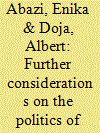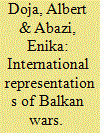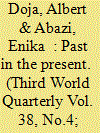|
|
|
Sort Order |
|
|
|
Items / Page
|
|
|
|
|
|
|
| Srl | Item |
| 1 |
ID:
124960


|
|
|
|
|
| Publication |
2013.
|
| Summary/Abstract |
In the standard tradition of both Albanian studies and Western scholarship, including either any interested religious and political activism or less 'interested' lay people, endeavours of historical and textual fact-finding have been relevant only to re-confirm and indeed perpetuate the very meaning of a myth, according to which the thinking of Naim Frashëri was formed and dominated by Bektashism and his 'Albanianism' had a Bektashi foundation. In an earlier paper this myth was shown to be unreliable by arguing that Frashëri's religious thinking was shaped by religious dualism. This paper argues further that Naim Frashëri went far beyond Bektashism in his heterodoxy, not only in a kind of liberation theology, but also by embracing a comprehensive pantheism which generated an active and all-inclusive attitude to Albanian identity, not necessarily limited in any special way to Bektashism. Methodologically, such a new picture must arise if the analysis of the historical and literary contextualization of Frashëri's major works is submitted to the perspective of social theoretical approaches to religion developed in sociology and anthropology.
|
|
|
|
|
|
|
|
|
|
|
|
|
|
|
|
| 2 |
ID:
147966


|
|
|
|
|
| Summary/Abstract |
This article introduces the socio-anthropological concept of international representations to examine the relationship between a civilizational rhetoric, the West European and the international politics of otherization and containment of Southeast Europe, and an essentialist and timeless bias in international relations theory, including both radical and constructivist trends. We first explore the different narrative perspectives on the Balkan wars from the beginning to the end of the twentieth century. Their subsequent problematization is aimed at challenging the way they have constructed commonplace and time-worn representations, which international society shares with different consequences in international affairs. This is a limited conception since international representations as a socio-anthropological concept are always socially, culturally and politically constructed, contested and negotiated. They do not neutrally refer to a reality in the world; they create a reality of their own. Moreover, this limited conception ignores the fact that how, by whom and in whose interest international representations are constructed is itself a form of power in international relations. Therefore, the way international representations are constructed can be problematized as an example of political and ideological projects that operate in the West as well as in the Southeast European countries that are the object of Western foreign policy.
|
|
|
|
|
|
|
|
|
|
|
|
|
|
|
|
| 3 |
ID:
152089


|
|
|
|
|
| Summary/Abstract |
In this article, we explore various forms of travel writing, media reporting, diplomatic record, policy-making, truth claims and expert accounts in which different narrative perspectives on the Balkan wars, both old (1912–1913) and new (1991–1999), have been most evident. We argue that the ways in which these perspectives are rooted in different temporalities and historicisations and have resulted in the construction of commonplace and time-worn representations. In practical terms, we take issue with several patterns of narratives that have led to the sensationalism of media industry and the essentialisation of collective memory. Taken together as a common feature of contemporary policy and analysis in the dominant international opinion, politics and scholarship, these narrative patterns show that historical knowledge is conveyed in ways that make present and represent the accounts of another past, and the ways in which beliefs collectively held by actors in international society are constructed as media events and public hegemonic representations. The aim is to show how certain moments of rupture are historicised, and subsequently used and misused to construct an anachronistic representation of Southeast Europe.
|
|
|
|
|
|
|
|
|
|
|
|
|
|
|
|
|
|
|
|
|